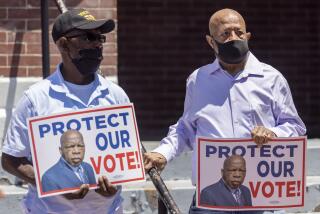Kurds Accuse Hussein of Election Sabotage : Iraq: The president is sponsoring a terrorist campaign to stop the vote, rebels say. Tensions rise in allied security zone.
- Share via
ZAKHU, Iraq — President Saddam Hussein is sponsoring a campaign of grass-roots terrorism in an attempt to sabotage approaching elections here in Kurdish-held parts of Iraq, allied and Kurdish officials charged Friday.
“Kurdish leaders say that Saddam will do everything in his power to disrupt the election. I agree with them,” said Army Col. Richard M. Naab, the American chief of the Military Coordination Center here that administers an allied security zone along the Iraqi border with Turkey.
Early Friday, Kurdish guerrillas intercepted Iraqi agents attempting to smuggle nearly 1,000 pounds of high explosives into Kurdish-controlled territory north of the 36th Parallel that includes a 75-mile-long security zone administered by the United States, Britain and France.
Kurdish leaders expect pressure and violence from Baghdad to accelerate in the run-up to a May 17 vote for an overall leader and a 100-member regional assembly that is described as the first free election in the history of modern Iraq.
“Saddam is determined to destroy our elections. He will fail,” said Mohammed Shawfik, a guerrilla commander who reported the seizure of about 900 pounds of TNT at a roadblock on a highway north of the city of Mosul.
Discovery of the explosives amounted to one more in a long line of provocative incidents in what Iraqi Kurdish leaders describe as a campaign of intimidation by Baghdad.
In recent weeks, Hussein has unsettled the Iraqi north with threatening troop and weapons movements, random shelling, car bombings and systematic harassment of civilians traveling between Iraqi-controlled and Kurdish-controlled zones.
Kurdish enthusiasm for the election is muted by a reality unchanged in the aftermath of the Persian Gulf War: Seen from an underdog Kurdish perspective, Saddam Hussein remains an implacable--and unbeatable--foe.
“For you, he is kaput. For us, he is a superpower,” Kurdish official Hussein Sinjari told one American.
The allied safe haven, roughly 75 miles wide by 35 miles deep, was created a year ago to encourage the return to their homes of up to 2 million Kurds who fled into Iran and the mountains of southern Turkey when Iraqi troops crushed a Kurdish uprising after the war. Since 1980, Hussein has warred almost unceasingly against Iraq’s 4 million Kurds, destroying 4,000 of 5,000 Kurdish villages and killing--by Kurdish count--at least 180,000 people.
Forbidden by the allied coalition to fly planes or helicopters north of the 36th Parallel, Iraq has effectively withdrawn from large areas, leaving a vacuum of authority. Today, in addition to the security zone, much of the area north of the parallel is also controlled by guerrillas representing a variety of Iraqi Kurdish groups that will compete in the election.
The Hussein government imposed a blockade of the Kurdish areas late last year, stopping the flow of goods and tightly controlling the movement of people. A Baghdad resident who recently arrived in Zakhu to visit his family described the gantlet of Republican Guard checkpoints as “an exercise of exquisite fear and tension.”
In March, Naab said, the Iraqi army started to concentrate troops along the border of the Kurdish-controlled areas.
“At first they described them to us as purely defensive, saying they feared attack by the Kurds,” Naab said.
Then car bombs began exploding. One killed a dozen people in the city of Sulaymaniyah near a headquarters used by Jalal Talabani, a candidate for Kurdish leadership.
In the would-be capital of Kurdistan, Irbil, another bomb blew up a few minutes after Talabani’s rival, Masoud Barzani, finished addressing a rally. In Zakhu, a cafe was blown up one night, as well as a house belonging to a Christian Arab who opposes the Hussein regime.
Toward the end of March, Iraqi artillery began shelling the village of Kalak, west of Irbil, that will be the site of the assembly to be elected next month. The shelling caused about 25,000 Kurds to flee the area around Kalak, by count of U.N. relief workers.
Earlier this month, Iraqi army antiaircraft missile batteries, positioned ever farther north, began locking on to American, British and French planes as they flew over the region. The missiles were at least partially withdrawn after a stiff allied warning, British Foreign Secretary Douglas Hurd said this week.
Now, Kurdish leaders say, Baghdad is training terrorists who plan to infiltrate the north before the election. In addition, several hundred members of the only Kurdish clan that supports Hussein--the election-bound Kurds call them “mercenaries”--have suddenly and provocatively moved into a triangle of land formed by the Iraqi, Turkish and Syrian borders.
The allies are asking coalition partner Turkey to extend the present protective umbrella of air patrols in the conviction that without continuing international vigilance, Hussein would once again attack the Kurds.
The allied presence on the ground, however, is limited to Naab and his handful of American, British and French staff officers. There are no troops. Security is entirely a Kurdish matter.
“I think Saddam wants to portray the region as a lawless society that needs the Baghdad government and its security forces to restore order,” said Naab.
“The provocations are a family matter, something the Kurds will have to control. I think they can do it.”
More to Read
Sign up for Essential California
The most important California stories and recommendations in your inbox every morning.
You may occasionally receive promotional content from the Los Angeles Times.













